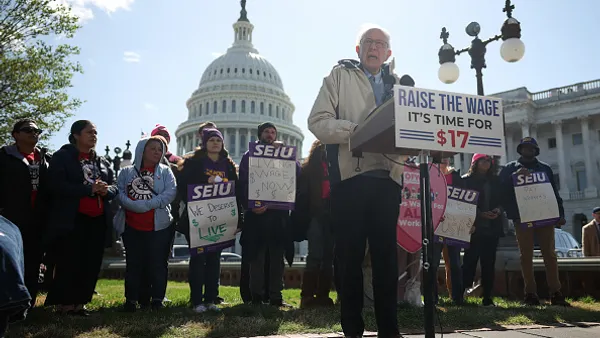Dive Brief:
- More than 60% of employers in a February WorldatWork survey said they utilized a geography-based pay policy, and 44% of that contingent are either considering or have recently modified such policies in response to an increase in full-time remote work.
- WorldatWork called geographic pay a "critical issue" for employers given the expectations of remote employees and employers' talent needs in a changing employment market. But while most employer respondents said they were willing to take a flexible approach to remote workers' voluntary relocations, only 29% said they would establish a legal entity anywhere in the U.S.
- Half of employees surveyed by WorldatWork said pay adjustments would be either "extremely" or "very" influential in their decisions to voluntarily relocate. Organizational approaches to geographic pay also are not uniform; only one-third of the 1,063 employers said their organizations created separate pay structures for each geographic location.
Dive Insight:
Remote work has altered compensation strategy at many organizations. A November 2020 Willis Towers Watson report found 49% of the 344 North America-based employers surveyed said that the extension of remote work arrangements beyond the pandemic could lead to a "hybrid reward model," which may include paying employees based on where they are located.
It is unclear, however, what such changes will ultimately mean for workers. In some cases, those who move to locations where salaries for their positions are less competitive could see a pay decrease. That is similar to the message Facebook CEO Mark Zuckerberg delivered to employees last May, and other organizations have indicated there may be similar shifts.
Some analysts in the HR space maintain that, given the global nature of talent in a world in which remote work is embraced, it may not make sense for employers to pay coveted talent less based on location alone. WorldatWork's survey found that while 55% of employers used city or metropolitan area as a basis for geographical pay differentials, "cost of labor is overwhelmingly a greater influence than cost of living for determining the pay policy approach."
On the whole, compensation plans are still in flux due to the pandemic. A 2020 Gallagher survey found the pandemic disrupted salary increase plans for 45% of employers respondents, and more than half, 51%, said they expected to reduce salary increases.












